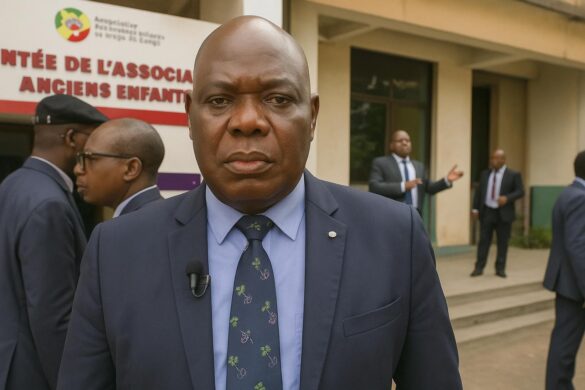A Literary Return to Mfoa Avenue
A soft Saturday light bathed the headquarters of the Association of Former Cadets in Brazzaville as tables filled with novels, short stories, and slim volumes of poetry. The 2025 edition of the group’s annual “book season launch” was dedicated to Charles N’Kouanga, a former cadet who transformed his military discipline into literary rigor.
Under the unifying banner “2,199 Pages of Charles N’Kouanga,” members, critics, and students browsed the entirety of his eleven published titles. The atmosphere blended academic debate with a sense of reunion: former classmates greeted each other while volunteers arranged stacks of freshly reprinted books for sale and signing.
AET: From Cadets to Cultural Guardians
Founded by alumni of the country’s military preparatory school, the Association of Former Cadets—AET by its French initials—has expanded its mission beyond camaraderie. The current president reminded the audience that knowledge and discipline are the two pillars the cadets aim to pass on to younger generations.
By dedicating an entire afternoon to literature, the AET signaled that civic service can include storytelling. He praised N’Kouanga’s journey from a teenager in uniform to an established author. “His pen, like his past, belongs to Congo but opens to the world,” he stated.
Fictional Mirrors of Society
A critic analyzed N’Kouanga’s 2021 thriller “The Intruder of the Caliphate.” He highlighted how the book intertwines cybersecurity, climate anxiety, and gender equality within a plot involving extremist threats. “The narrative warns without ever preaching,” he asserted, calling it “a mirror held up to our urban debates.”
A journalist-diplomat continued, noting the author’s meticulous research on terrorism. “You close the book with sharper questions,” he observed, suggesting the novel could enrich classroom discussions on national security without glorifying violence.
The debut novel “The Tramp,” initially published in 2014, caught the attention of another critic. He described it as a hybrid work combining the rhythm of poetry with the tension of a short story. The text, he said, unravels a confrontation between two African immigrants and a French passerby, challenging readers’ assumptions about identity and dignity.
Poetry That Refuses Silence
Turning to poetry, a doctor-writer explored the two twin collections “Marlyc Hosts” and “Leyen Odes.” He praised their tonal range, from elegiac whispers to staccato protest. “N’Kouanga denounces injustice without losing lyrical grace,” he said, before reading verses describing death not as an end but as “a folded horizon.”
As the critics concluded, a slam artist electrified the room with rhythmic reinterpretations of selected stanzas. Fresh from winning a prize in Abidjan, he bridged the page and the stage, highlighting how Congolese poetry now circulates beyond borders. Applause erupted from students sitting on the floor, their smartphones glowing in video mode.
The Author Explains His Common Thread
Invited to respond, N’Kouanga
